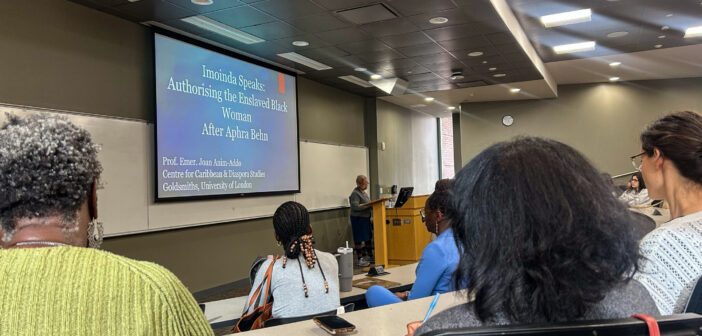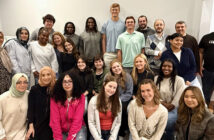Editor’s note: This article has been updated to correct Joan Anim-Addo’s title.
As part of Lehigh’s Spring 2025 Visiting Faculty Scholar program, visiting faculty fellow Joan Anim-Addo invited the campus to explore themes of identity, culture and representation from March 18 to Friday.
By leading a series of events that included a student-faculty discussion, a public lecture and a film screening, Anim-Addo explored her own work in response to the underrepresentation of African Caribbean women in literature.
Simone A. James Alexander, director of Africana studies and professor of English, launched the Distinguished Speaker-Lecture Series upon stepping into the director role in July 2024. She said she created the series to bring renowned writers to the Lehigh community and offer students, faculty and local residents an opportunity to engage with them.
“My ultimate goal with these events is to put the spotlight on Africana and on Lehigh as a whole,” she said. “It’s about bringing visibility to the program.”
Anim-Addo’s work explores themes of identity, belonging and cultural heritage, highlighting the complexities of race, gender and migration.
As a writer and scholar, she has earned numerous recognitions in her field, including being named a British Academy/Leverhulme Senior Research Fellow — a prestigious fellowship that supports established scholars by providing relief teaching and administration duties to pursue major research projects.
According to the College of Arts and Sciences’ website, Anim-Addo was also the United Kingdom’s first Black professor of literature and the humanities. She currently serves as an emeritus professor and director of the Centre for Caribbean and Diaspora Studies at Goldsmiths, University of London.
She’s also the editor in chief of the Bloomsbury Encyclopedia of Black British Writing and the founder and editor of Blacklines: The Journal of Black British Writing.
Alexander said one of the courses offered through the Africana studies department, Contemporary Black Literature, aligns with Anim-Addo’s work. She also said the lecture series gives students in this course, as well as those in other academic disciplines, an opportunity to hear from an expert discussing topics they have been studying.
During her lecture on Thursday, Anim-Addo discussed her experiences with literature and the underrepresentation of African Caribbean women in the field.
“It was a devastating revelation,” she said. “Where were African Caribbean women in literature?”
When sharing her personal experiences in her field with the audience, Anim-Addo said it was historically easier for writers to be published if they used male names. Had she known this sooner, she said she would’ve gone by “Jo” instead of “Joan.”
In her lecture, she also discussed her discovery of Aphra Behn’s “Oroonoko” and its Black female character Imoinda.
Drawing inspiration from Imoinda, she said she adapted Behn’s “Oroonoko” into an opera centered on the triumphant survival of African heritage as she guided attendees through her work.
Alexander said she hopes the lecture series offers students and faculty a new way to engage with their education and interact with diverse perspectives.
In the context of higher education, she said there’s an ongoing effort to push back against the setbacks in the education system, particularly the dismantling of African American history and literature in curriculums.
“I feel as though the kind of work that we do, we are resisting the erasure of African American people and history,” Alexander said.
Vera Fennell, a professor of political science, said she encouraged students in her classes to attend the events, as she thinks students often don’t appreciate the things going on at Lehigh.
“I want them to understand that education is a broad experience, and because it’s a broad experience, it can be a lifelong experience,” Fennell said.
Eldisa Rosario, ‘26, a student in one of Fennell’s classes which focuses on Asian and American studies, attended the lecture.
She said she thinks it’s important for students to learn about the topics discussed in the lecture series.
“It helps you think outside of the box and just look at things differently,” Rosario said.
Stephanie Powell Watts, a professor of English and Robert D. Rodale, chair of writing, also attended the event on Thursday and shared a similar sentiment to Rosario.
“I think that anytime that we engage in these sorts of discussions with people who are not necessarily like us or not from the places that we’re from, either metaphorically or literally, we expand our minds,” Watts said.
Through Anim-Addo’s events and future events hosted by the Africana Distinguished Lecture Series, Alexander hopes to inspire students to become global scholars.
She said she feels as though people are intolerant because they haven’t reached out to understand differences, and the series aims to change that.
“I’m hoping students will reach out in the physical domain and the literary domain,” she said.






Comment policy
Comments posted to The Brown and White website are reviewed by a moderator before being approved. Incendiary speech or harassing language, including comments targeted at individuals, may be deemed unacceptable and not published. Spam and other soliciting will also be declined.
The Brown and White also reserves the right to not publish entirely anonymous comments.